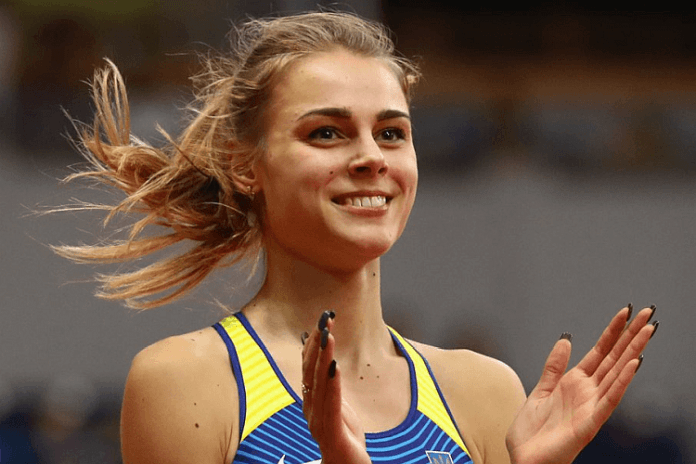A pretty good European team had no trouble outscoring a mid-level U.S. team, especially in the field events, and won The Match: USA vs. Europe in Minsk, 724.5-601.5.
The marks were uninspiring in many events, but there were some real highlights – including an impressive Allyson Felix relay leg – starting with the women’s high jump.
The obvious favorite was Russian Mariya Lasitskene, who came in as the world leader at 2.06 m (6-9) and had won 18 straight meets. But Ukraine’s Yuliya Levchenko, the 2017 Worlds silver medalist, was on her game, clearing five heights in a row through 1.98 m (6-6).
Due to the rules in place for this meet which allowed each entry a total of eight jumps in the competition, Laskitskene made 1.98 m on her second try, but had only three jumps left. So when Lasitskene made 2.00 m (6-6 3/4), Laskitskene failed once, then passed to 2.02 (6-7 1/2). Levchenko made it for a new lifetime best and Lasitskene missed and then both went to 2.04 m (6-8 1/4). Lasitskene missed and then Levchenko, as the winner, had three attempts and missed all three times.
But it’s a big win for the 21-year-old Levchenko and moves her no. 2 on the world list for 2019. Can she win again at the World Championships in Doha?
The best race of the day was the men’s 3,000 m, where Ben Blankenship of the U.S. held off a straightaway challenge from Adel Mechaal of Spain, winning in 7:47.48 to 7:57.55. Other events of note (see the complete results here):
● Men/200 m: Turkey’s Ramil Guliyev continued to look strong, winning by 5 m in 20.16, in a race that looked faster.
● Men/110 m hurdles: Spain’s Orlando Ortega won easily in 13.21, confirming his place as a medal favorite in Doha, ahead of Russian Sergey Shubenkov (13.39).
● Men/Pole Vault: Sweden’s Mondo Duplantis had no trouble winning at 5.85 m (19-2 1/4), over Poland’s Piotr Lisek (5.80 m/19-0 1/4).
● Men/Triple Jump: American Chris Benard won at 17.01 m (55-9 3./4).
● Men/Javelin: Estonia’s Magnus Kurt is still the world leader, but now there are two men over the 90 m mark in 2019, as German Johannes Vetter won with a throw of 90.03 m (295-4)
● Women/1,500 m: Kate Grace set a lifetime best after taking charge down the home straightaway in 4:02.50, ahead of Shannon Osika (4:04.92), who carried much of the pacemaking.
● Women/100 m hurdles: Sharika Nelvis was away cleanly and ran away with this event, winning in 12.80 in another race which looked faster than the clock said it was.
● Women/Long Jump: The local crowd was happy with the win by Nastassia Mironchyk-Ivanova at 6.84 m (22-1 1/2), with Ukraine’s Maryna Bekh-Romanchuk second (6.73 m/22-1) and reigning World Champion Brittney Reese of the U.S. in third (6.71 m/22-0 1/4).
● Women/Shot Put: A nice surprise from Maggie Ewen, whose third-round throw reached 19.47 m (63-10 1/2), a lifetime best. American Chase Ealey, expected to be a medal contender in Doha, was fourth at 18.83 m (61-9 1/2).
The final event was another oddball relay, a mixed Sprint Medley of 200-200-400-800 m, but there was interest to see what Allyson Felix would do on the third leg. Her U.S. team had the lead after the two 200 m legs and Felix took over, ran smoothly and extended the lead, running a very encouraging 50.10 and handing the stick to Isaiah Harris for the anchor.
The U.S. was 1-2 with Harris and Brandon Kidder on the backstraight, but Amel Tuka (BIH) waited and waited and then struck on the straightaway, running down both to finish with a 1:46.63 leg to win in 3:21.13. Harris ran 1:47.59 and Kidder, 1:47.51, to finish third.
(More on Felix: a 50.10 relay leg doesn’t sound like much compared to her pre-maternity times, but consider that only four women in the world have run faster than 50.20 this season. This was the strongest signal yet that there is a lot more to come from Felix, which might be her greatest achievement of all.)
The scoring breakdown showed the U.S. winning the sprint events and even the distance races, but getting pounded on the infield:
● Sprints: U.S. 225.5, Europe 224.5
● Distance: U.S. 149, Europe 145
● Field: Europe 355, U.S. 227
Over the two days, the U.S. won 20 of the 36 events, but Europeans won 45 of the 72 second and third places and won comfortably by 724.50-601.50. The meet was well conceived and appeared to be well run, but its place on the calendar – due to the lateness of the World Championships – kept it from attracting a better level of American athletes. Hopefully, it will be tried again, inside a more normal summer schedule.
















